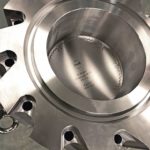Mr. Penno, on-site acceptance tests are part of the daily business of industrial manufacturers and plant operators alike. How does that usually work?
Penno: According to PED, various DIN-EN standards, ASME and other international regulations, safety-relevant components such as rupture discs must be tested by the manufacturer. This is often witnessed by notified bodies such as TÜV. However, many operators additionally conduct their own tests to ensure that the delivered products comply with the required specifications and performance features. As we are an established player on the worldwide rupture disc market, our customers have also come from all over the world to Brilon in North Rhine-Westphalia for on-site acceptance tests.
Which changes are there now due to coronavirus?
Penno: Coronavirus has put a stop to this. Travel restrictions in the lockdown, such as the restrictions on entering Germany from high-risk areas, make acceptance tests by customers in Germany and abroad significantly more complicated. Ultimately, these trips pose a health risk to everyone involved. We therefore looked for alternatives and the Rembe Digital Audit was born.
How does the Rembe Digital Audit work?
Penno: In principle, it is quite simple. The operator or the certified inspection body observes the testing of the products via video conference. However, this requires a precisely defined documentation process. For this purpose, we have to clarify in advance with the customer exactly what he wants to see, so that we can prepare ourselves accordingly and position the equipment. Of course, this procedure somewhat increases the effort involved in the acceptance test, but, in principle, it is not a problem because the operators have very clear ideas about what should be shown during the video conference.
Mr. Villmer, could you please tell us how the Rembe Digital Audit got started?
Villmer: It was actually quite straightforward. Due to the first lockdown, a customer acceptance test could not take place as planned, but the customer urgently needed the new rupture discs. So I took my mobile phone, went to production and filmed. Today we do it much more professionally, but back then it was the only way to get the goods to the customer quickly.
And what does this look like today?
Villmer: My mobile phone stays at my desk during acceptance tests now, and instead we have taken advice from professionals in the film business and invested a considerable amount of money in high-quality equipment. In addition to individual burst tests and customer acceptance tests, we now even handle the certification of our products with international testing bodies digitally. We produce a rupture disc batch in advance and a second batch in the “digital presence” of the auditor. Subsequently, both are examined, then further steps follow.
At the end of June 2020, we had an interesting acceptance test with three different high-temperature rupture discs of up to 30″ in diameter, all for the same production facility. Due to their intended use, these must, of course, also be tested at correspondingly high temperatures. This means that there are long waiting times between tests, as only one rupture disc at a time can be brought up to temperature and then tested. In the case of a normal acceptance test, this would mean that the plant operator would have to assign one or more employees, who would be on site at Rembe for several days. With a digital audit, we reduce the time required from the customers side to a minimum as there is no travel time etc. and the customer is only present (digitally) when tests actually take place. It also saves Rembe customers a lot of money.
How does a normal digital audit work?
Villmer: Each digital audit is totally customer specific. There is no standard workflow in the true sense of the word, but some acceptance tests are consistent in many respects. We usually start with a general introduction, this is led by the contact person already known to the customer. This also gives the customer the opportunity to ask questions before the actual audit begins.
The burst tests usually start then, but we might also start with a pre-test or a digital guided shopfloor tour. This depends on the scope of the audit and the customer requirements. In some cases, not only are the rupture discs tested, but also the associated holders. Particularly in the case of larger acceptance tests, the actual product tests are followed by further agenda items in which tag plates, operating manuals, shipping formalities and other product-related topics are discussed. This also includes the review of all documents including certificates. But those of us from the technology department are on the outside for this and leave that to our colleagues from the sales department.
Mr. Penno, how many digital acceptance tests are currently taking place in your company?
Penno: At the beginning of the pandemic, performing acceptance tests digitally was uncharted territory for us as well, but it is now part of our daily business. On average, we carry out two to three digital acceptance tests per week. For more complex acceptance tests, we provide the option to carry out a trial run of the acceptance process, thus enabling the buyers of Rembe products to gain an understanding of the likely outcome and to define any additional requirements if necessary. In the case of larger acceptance tests or certifications by notified bodies, we carry out a pre-test to guarantee that everything really is exactly as it should be.
Digital formats continue to advance. How is the Rembe Digital Audit developing?
Penno: In addition to traditional acceptance tests, Rembe Digital Audit now also offers burst tests, technical inspections such as hydrostatic tests, factory inspections and installation support. Customers can also benefit from the digital service: for example, there is no need for time-consuming travel and the costs associated with this. Colleagues and partners at other locations around the world can participate in acceptance audits and tests, even at short notice. At the same time, full digital documentation is provided, including images and sound.
What would you recommend to plant operators regarding digital acceptance tests?
Penno: In principle, these digital acceptance tests are only recommended if dealing with well-known and trustworthy manufacturers. However, this applies across the board for safety-critical components, i.e. not just for acceptance tests.
Mr. Penno, what is your conclusion regarding coronavirus and digitalisation?
Penno: Despite all the negatives, a crisis like the current coronavirus pandemic also holds opportunities for further development. We are seeing this everywhere right now with the topic of digitalisation. If international flights are not possible or only possible to a very limited extent, alternatives must be found. It is not only audits between operators and manufacturers of components that are now held digitally. Component manufacturers are also increasingly reaching agreements with official certification bodies using digital solutions. That’s where the future will be.
Rembe GmbH, Brilon, Germany
The interview was conducted by:Dr. Bernd Rademacher
Editor









